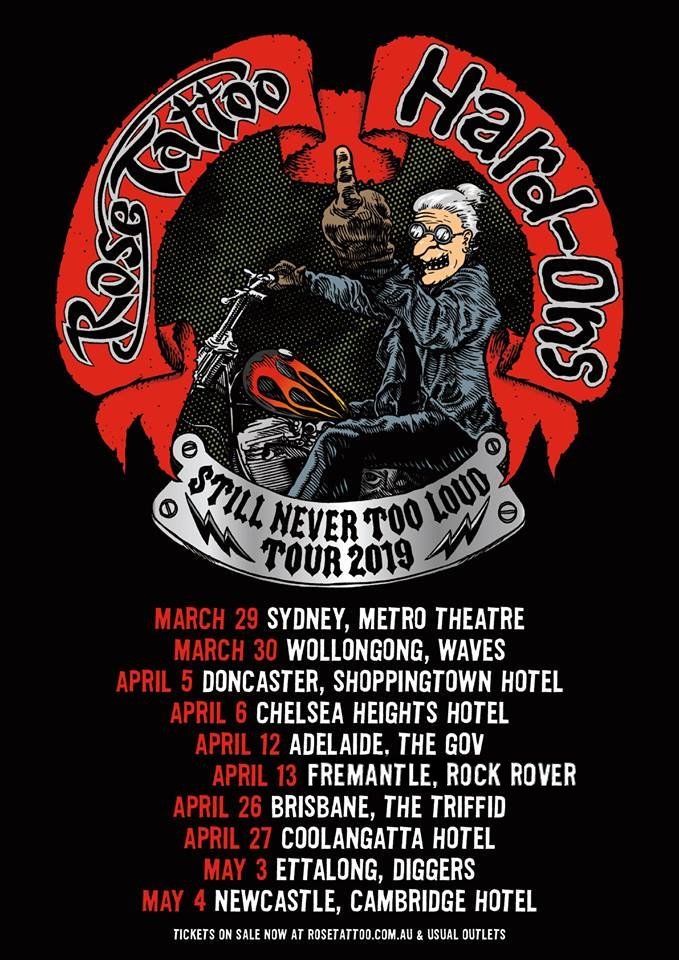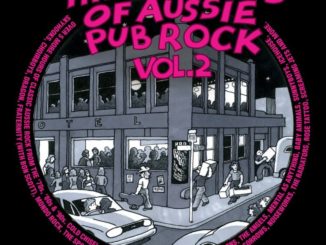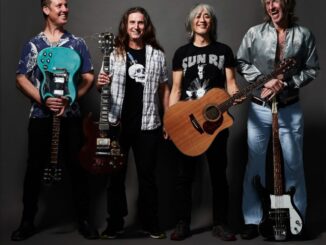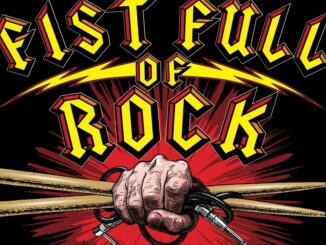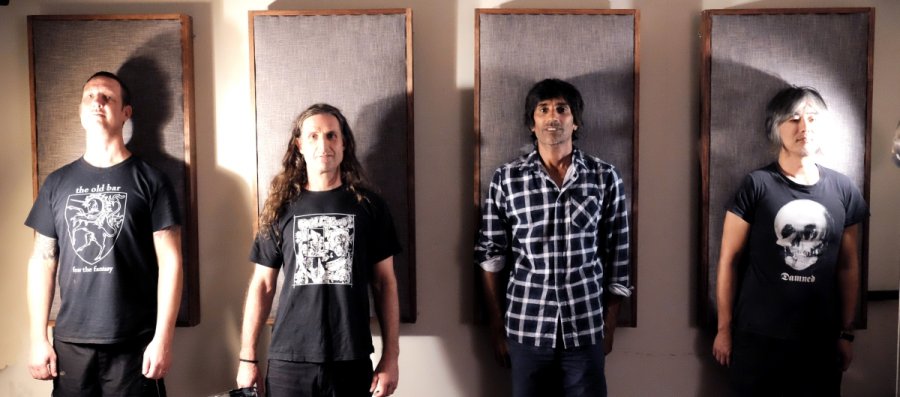
The Hard-Ons are pretty much an institution in the Australian punk rock scene and a name synoymous with the good old days of the Aussie pub rock circuit. They also are a band that first introduced me to the world of live music, a concept that as a young kid was merely looked at as an arena or stadium affair but deep in the underground lay an entire scene full of the good stuff that eventually came to be an almost weekly thing to this day as a punter and support of local and live music. The band are hitting the road with another Australian legend, Rose Tattoo including a trek out west so I grabbed some time with bass player Ray Ahn to not only let him know how much of an impact his band had on my life with music but to also discover where it all started for himself.
Andrew: So we have a lot to talk about, obviously you have the tour coming with Rose Tattoo which is exciting as you guys seem to be the perfect combination of pure, unadulterated Aussie rock combination I guess.
Ray: Yeah a lot of similarities there but also lots of differences as well. Those guys started playing before punk happened so they have a boogie and a bluesy sound like what AC/DC have. Angry [Anderson] used to play in a band called Buster Brown with Phil Rudd from AC/DC, the drummer which I don’t know if you knew about that.
Andrew: I think I may have heard about that.
Ray: And the current bass player for Rose Tattoo is Mark Evans and obviously Rose Tattoo were originally signed to Albert Productions so there’s a lot of good lineage there to AC/DC who is Australia’s most important rock n’ roll band. Rose Tattoo are a supremely important, historic rock n’ roll band and the lead singer Angry is 71 and is he is still going and they’re still kicking on so obviously it’s a bit of a buzz for us to play with them and they asked us to play. But we’re from a different era, we formed our band after punk happened so everything we do is tainted and touched by what happened in 1977 with bands like the Ramones and Sex Pistols and the Damned and things like that. So Rose Tattoo’s reference points are different to our reference points, our reference points are things like the Stooges and Velvet Underground and things like that and they come from a different kind of background. But still, we’re talkng about very amplified loud music so we have a lot of similarities there. When the Hard-Ons first started it was 1984 so we were at the last phase of the Australian pub rock circuit where bands used to play 4 or 5 nights a week and that’s what bands did, they got into a couple of cars and just drove all around Sydney playing almost every night and that’s how they made a living. It was considered hard work but it was work, it’s what bands used to do. So we have similar work ethic from that perspective.
Andrew: For sure and I guess that’s one of the biggest changes from back in the day compared to how it is now is the live music scene and how the music industry works and all that. From your perspective what do you think has been the biggest change since the Hard-Ons first came onto the scene?
Ray: The biggest change hasn’t been the internet or anything like that, those things don’t really change much other than how you get the word around. But to me the biggest change has been the advent of the festival scene replacing the pub rock scene, so people maybe squirrel their money away and go to 3 or 4 massive festivals a year because you need money for the concert tickets and also travel as well because Splendour In The Grass, people from Sydney go up there and it’s very far away for example. Dark Mofo happens in Tasmania and people from all over Australia go there so you have to save your money for travel and the concert and your drugs and any left over money goes to the cops to bribe you off.
Andrew: [laughs].
Ray: So you have to squirrel money away to go to maybe 4 or 5 big tours a year so it just works out that there’s less money around for watching bands 5 nights a week. I used to go regularly to go see bands 4 or 5 nights a week but that was the early 80’s and a different time so that’s just how it was. There aren’t 4 or 5 gigs a week now so what happens now is you have to somehow manipulate your band to be worthy of a festival slot because once you go on a festival, it’s obviously much easier for your band to get noticed than if you’re slogging away 5 nights a week. Bands like the Hard-Ons, there was a lot of self-reliance there. All you had to do was have a bit of mitigated gall, form a band, go get some equipment and then get a couple of cars and go, ‘OK we’re going to practice our arses off and then for the next 8 months we’re going to play every night’. There were gigs there so you could do that and once you got enough money you could go record, obviously recording was a lot more expensive back then and that’s what you kinda did. That kind of a pattern and paradigm for being in a band doesn’t seem to exist anymore, it’s a lot different. I guess it’s not bad or worse, it’s not better. I don’t know what it is, it’s just different I guess.
Andrew: Yeah I think you are right. A lot has changed, people listen to music differently compared to how we used to listen to it like with streaming and all that stuff. Are you into modern technology as far as listening and checking out new bands or do you stick to CD’s and records and and that kind of stuff?
Ray: Na my take on it is whatever it takes to hear your music. It doesn’t really matter and to be honest everyone bags out streaming for having bad quality and stuff and I think that’s probably true but a lot of records I used to like were Garage music from the 60’s and they had terrible sound.
Andrew: That’s true.
Ray: I don’t know but I like the work of art so for example Pink Floyd “Dark Side Of The Moon” came with two big posters and a postcard in there and the record folded out and on the front cover it didn’t say anywhere Pink Flord Dark Side Of The Moon, it just had a prism with a rainbow sticking out of it. That was a work of art so I want to have the record with the posters in it and the gatefold sleeve because I need to absorb the entire art, what the band wanted to say. The art wasn’t presented to the world back in the early 70’s when the record came out with the idea of streaming, that wasn’t thought after so if I want to absorb the whole art which is what I want to do as a fan, I need the LP, I need the vinyl. With modern bands now, if you said to me, ‘Hey Ray listen, I’ve got a band and it’s called Andrew. I’ve putout a new album, would you like it?’ I’d go, ‘Yep’, and then you tell me, ‘You got a choice, LP, CD, what do you want?’ Well I would take the CD thanks so I can listen to it in my car straight away. Because you didn’t have to put out the record and then 30 years later as an afterthought put it out as a CD and go, ‘Oh geez now that I shrink all this original artwork down to a tiny little square’. Now that it’s happening right now I don’t care whether it’s a CD or LP but if that happened in 1974, I wanted how the band wanted me to see it. Does that make sense?
Andrew: Yeah it does and I agree. it’s everything that is available and it gives people options in whatever way they prefer. That’s the great thing that’s happening now is you do have the options to listen to music in however you like I guess.
Ray: Yeah exactly.
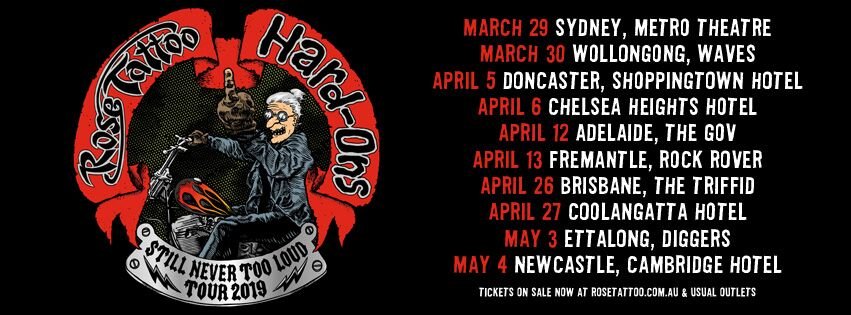
Andrew: We’re based in WA over in Perth and I know you were here I think late last year where you did a couple of shows on this side of the country?
Ray: Yes we did it late November/early December I think.
Andrew: So how did it go? What’s your history like with WA over the years? Have you had a good time over here?
Ray: We had a great time every time we came over there. I think Western Australia is a little bit like Adelaide and Brisbane, what I mean by that is we’ve got friends who play in bands in America and they are all in kind of smallish bands but they can exist by playing non-stop because it’s such a big country. For example we’ve got friends who are based in Minneapolis and they go to Chicago, New York, Philadelphia, Buffalo, New Jersey. They go all over, they go to Trenton and it’s not that much travelling really but if we want to go to Perth, we have to fly and that means we have to pay for hired equipment or scab it off other bands that are playing on the bill. It’s a lot harder for Australian bands because we’re so isolated geographically but I guess one of the good things about being isolated geographically is that culturally you start developing on your own and it’s a fantastic thing. So for example some of our favorite bands are from Perth – The Victims, The Scientists, The Triffids – all those bands were uniquely from Perth and they had their own sound. Same as Adelaide, Adelaide had their own scene. Queensland, Brisbane had their own scene. So there’s something to be said about this vast remoteness of Australia, it does present to you some really fantastic, unique music and Australia has to be considered as a real hotbed of underground music. If you go to Europe or the States or Japan, everyone will tell you, ‘Hey how come your music in Australia is so incredible?’ And you go, ‘I don’t know’.
When these incredible bands were coming out of Perth for example in the late 70’s and 80’s to mid 90’s, Perth didn’t have a huge population but they just kept churning these bands out. I mean how many people live in Paris? How many bands come from Paris that you go, ‘Wow they’re world class’. A handful but for a city that big, they should be churning out 20 bands a year at least but they don’t. So the first time we went to Perth, we were like, ‘Wow this is where The Victims came from’, and The Scientists and bands like that. We were freaking out so none of those things have changed at all.
Andrew: Yeah Perth has had a sort of unique situation in that it is very isolated and has churned out their own signature sound I guess. Just in Australia alone has there been a particular place over the years that you have really enjoyed playing more so than anywhere else? Any particular favorite place you like performing at?
Ray: Yeah we like Perth as probably one of the best places to play in Australia. For some reason Perth audiences take the music fans thing up a notch a little bit more, I’m not sure why but there’s something a little bit crazy in the air when you play Perth, there’s a little bit more electricity in the air. I’m not sure what it is but some of the bigger cities in the east, I know the audiences can get a little bit like, ‘We’ve seen this a million times before’. And because the Hard-Ons don’t go to Perth as much as play in our own hometown, maybe that’s why. They go, ‘Finally it’s taken a couple of years but you’ve come back here’ and so people really appreciate it. That kind of stuff is important to the Hard-Ons because we’re a live band, predominantly we’re a live band so obviously having some kind of electric atmosphere in the room really helps a band like us to a big degree.
Andrew: Yeah I think you’re onto something there, I think it’s because Perth doesn’t get all the bands coming over on a regular basis that people are a little more appreciative of bands coming over this way.
Ray: Yeah but look at some of the bands that come from there. One of the best punk bands in Australia are a band called The Leeches and they’re from Perth and they are just incredible. There’s always good bands there, I saw a band from there not long ago called Helter Skelter and I was completely blown away and just couldn’t believe how good they were.
Andrew: Yeah amazing and especially like what we touched on before with the internet giving us access to this music that I guess was a lot harder to find out about back in the day. So there’s that sort of thing where you are discovering all these new bands all the time now which is great.
Ray: Yeah that’s exactly right.

Andrew: So let’s go back a little bit in time and before the Hard-Ons came into existence, how did you personally get into music? What made you decide this is what you wanted to do?
Ray: My next door neigbour back in the mid-70’s had a pretty big record collection and I guess I was 10 and he was 15, he was 5 years older than me and he was already in high school. This was 1975 and he was into things like David Bowie, Skyhooks, AC/DC was starting to make a name for themselves for example and he used to go to community hall dances and go see AC/DC and Teg Mulry Gang and stuff like that and he would come back and go, ‘Hey listen I just went to Hurtsville Community Centre and I just saw AC/DC’. And I would go, ‘Well gee what was that like?’ He would go, ‘What do you think it was like? It was incredible!’ So he would play us the records and stuff and I was only 10 at the time but we maintained our friendship and by the time I got into all these bands and started buying these records on my own I was already 12 and around when I turned 12, punk rock happened and he gave me his Sex Pistols “God Save The Queen” 7 inch in the picture sleeve. I thought that was way different to anything like Led Zeppelin or Deep Purple, it was a very different sound. Kind of sloppy but very violent, the sound was really noisy and I just kind of fell in love with it.
All of us were at the same primary school and then by the time we got into high school the other two guys in the Hard-Ons were already forming a band and I was kind of getting in the shits because I wanted to form my own band but it was a little bit hard for me because I wanted to play guitar but everyone seemed to be a guitar player. So my Mum bought me a bass so I can join a band because there weren’t too many bass players around where we were and I joined the Hard-Ons from that moment.
Andrew: It’s funny that you mention with the bass about starting out wanting to be a guitar player because almost every bass player I have ever talked to said the same story, they all wanted to play guitar first and then they sort of fell into the bass thing by accident. But I guess you probably appreciate the bass now a lot more than when you first started.
Ray: Yeah the only time I play guitar is if someone has got an acoustic and I just strum a couple of non- chalant pathetic chords and that’s about it. I wouldn’t even consider playing guitar ever again because I’ve been playing bass now for 35 years and I still have no idea if I’m doing the right thing! You always tend to learn, it’s such a difficult instrument to get really good at. I mean it’s the easiest thing in the world to play if you want to just be pretty basic and play along to a garage band, then it’s fine. After one week you are already off and running because it’s not that much harder than clapping really but then if you wanted to be a little bit more adventurous, if you want to get your own signature sound, if you want to contribute a little bit more and then there’s obviously less places to hide than a rhythm guiutar. I can form a band tomorrow with my electric guitar and a distortion pedal and still sound ok but fora guitar player to go the other way, to be a really good bass player, I find it a lot more challenging I think. You can’t really hide behind too many things, it’s very unforgiving if your timing is sloppy. So for that reason it’s a really under appreciated instrument I think, I mean how many bands do you watch and go, ‘Oh wow that bass player, he’s a really good bass player’. It’s always the lead singer or the lead guitarist. I saw a band from Adelaide not long ago called Hydromedusa, they had like 7 people in the band. The bass player was phenomenal, I just could not believe what I was seeing. He wasn’t playing complex stuff, what he was doing was playing simple stuff but embellishing it a little bit but playing it so tight and so wound up that there was all this tension in their rhythm. It was like a tightly coiled string and he was the main guy that was just pushing the band along like that and I just thought, ‘Wow what a great bass player’. And then I turned around and I looked at the guitar player in the Hard-Ons and I just went, ‘Did you see this bass player and what he was doing on stage right now?’, and he just went, ‘Oh my god, what a bass player’. He just really stood out and I just think it’s a hard instrument and I do think that I’ll never player guitar ever again, I just want to.
Andrew: Yeah it is an under appreciated instrument for sure and I like to think it’s sort of the backbone to a band especially in the rhythm section, and integral part of any band’s core sound.
Ray: Yeah totally! I couldn’t imagine what it would be like playing in a band like the White Stripes, geez!
Andrew: [laughs] Anyway we are looking forward to this tour, we will catch you in Fremantle on April 13th over on our side of the country. I hope you enjoy yourselves on this tour, looks like it will be a fun one with the guys in Rose Tattoo. Appreciate your time and good luck on the tour!
Ray: Thank you very much!
‘STILL NEVER TOO LOUD’ TOUR 2019
Friday 29th March 2019 – Metro Theatre, Sydney NSW – Tickets
Saturday 30th March 2019 – Waves, Wollongong NSW – Tickets
Friday 5th April 2019 – Shoppingtown Hotel, Doncaster VIC – Tickets
Saturday 6th April 2019 – Chelsea Heights Hotel, Chelsea Heights VIC – Tickets
Friday 12th April 2019 – The Gov, Adelaide SA – Tickets
Saturday 13th April 2019 – Rock Rover, Fremantle WA – Tickets
Friday 26th April 2019 – The Triffid, Brisbane QLD – Tickets
Saturday 27th April 2019 – Coolangatta Hotel, Coolangatta QLD – Tickets
Friday 3rd May 2019 – Diggers, Ettalong NSW – Tickets
Saturday 4th May 2019 – Cambridge Hotel, Newcastle NSW – Tickets
Tickets on sale Monday 14th January from rosetattoo.com.au & usual outlets.
